Physical Address
304 North Cardinal St.
Dorchester Center, MA 02124
Physical Address
304 North Cardinal St.
Dorchester Center, MA 02124

Get ready to discover why RV vacations could revolutionize your family's summer plans and save thousands you never expected.
You’re probably tired of dropping hundreds on hotel rooms that feel cramped and sterile, while your kids complain there’s nothing fun to do. An RV vacation changes everything – you’ll cut costs dramatically while giving your family the freedom to wake up somewhere new each morning. Think about it: your own kitchen, bathroom, and beds, all while exploring multiple destinations without constantly packing and unpacking. But here’s what most families don’t realize before they commit.
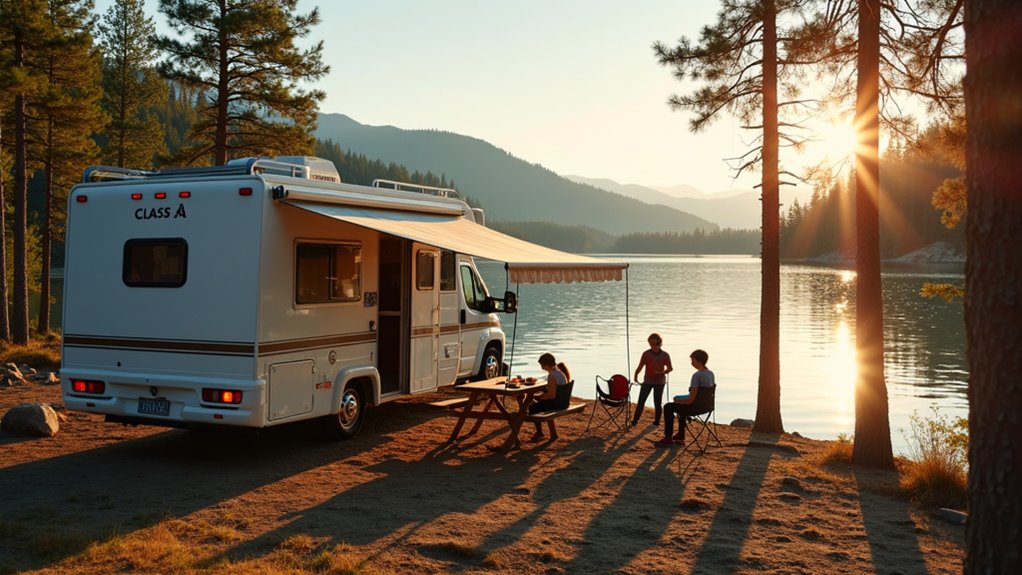
When you’re planning a summer family vacation, an RV can slash your expenses considerably compared to booking multiple hotel rooms night after night. You’ll eliminate costly hotel fees that quickly add up, especially during peak summer season when rates skyrocket.
Instead of paying $150-300 per night for family accommodations, you’ll spend around $30-50 for RV campground spots.
RV campgrounds deliver incredible value at just $30-50 nightly versus hotels charging $150-300 for comparable family accommodations.
Your food budget shrinks dramatically too. Rather than eating every meal at restaurants, you’ll cook in your RV’s kitchen using groceries that cost a fraction of dining out. Pack lunches for day trips instead of buying overpriced theme park food.
RV rentals typically cost $100-200 daily, but when you factor in eliminated hotel and restaurant expenses, you’re looking at substantial savings that’ll stretch your vacation budget much further. While RV camping offers these significant cost advantages, it’s worth comparing it against tent camping to determine which camping style best fits your family’s budget and comfort preferences.
Unlike traditional vacations where you’re tied to one hotel location, an RV gives you the flexibility to wake up somewhere new whenever wanderlust strikes. You can start your morning at a lakeside campground, drive to mountain trails for afternoon hiking, then settle into a desert park for stargazing.
This mobility lets you maximize your vacation time without constantly packing and unpacking suitcases or checking in and out of different hotels.
Your family can follow spontaneous discoveries—that roadside attraction the kids spotted or the scenic detour locals recommended. You’re not locked into rigid itineraries or non-refundable hotel bookings.
If one destination doesn’t captivate your family, simply move on. This freedom transforms your summer vacation from a static experience into a dynamic adventure where every day offers new possibilities.
The key to enjoying this flexibility is perfect planning that allows for spontaneity while ensuring you have the essentials covered for your RV adventure.
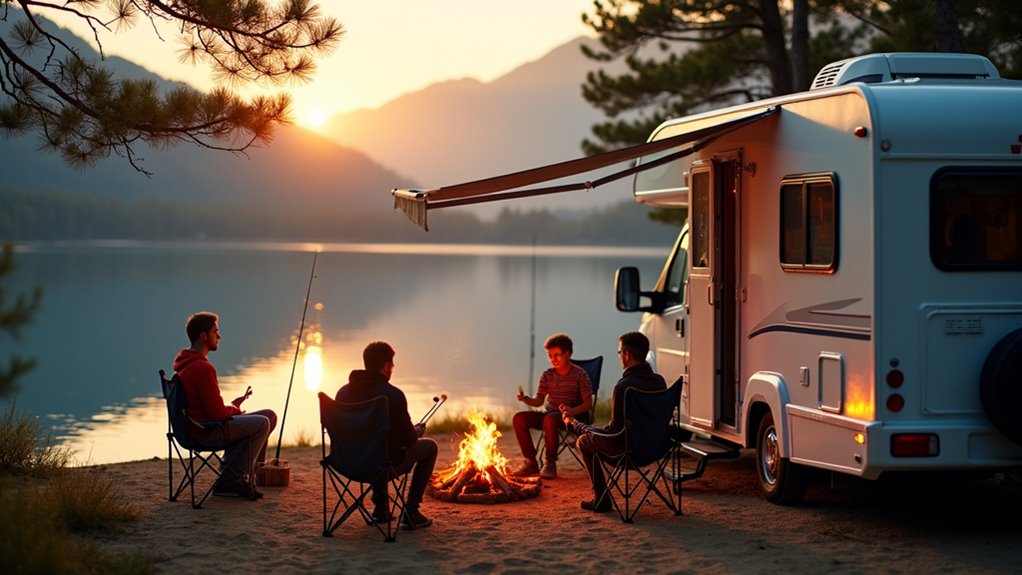
While modern life often scatters family members to separate screens and schedules, RV travel naturally draws everyone together in one shared space. You’ll find yourselves playing card games during rainy afternoons, cooking meals together in the compact kitchen, and sharing stories around the campfire each evening.
The close quarters might seem challenging at first, but they create opportunities for meaningful conversations that rarely happen at home. Your teenagers can’t disappear to their rooms, and you’ll discover new things about each other during long stretches of highway driving.
Simple activities like maneuvering together, setting up camp, or exploring hiking trails become shared adventures. These moments build lasting memories that cost nothing extra but prove invaluable for strengthening family relationships. RV camping can be especially accommodating for families with special considerations, such as expecting mothers who need comfortable sleeping arrangements and easy access to facilities.
Since you’ll be living in your RV for days or weeks at a time, certain features can make the difference between a comfortable adventure and a cramped ordeal. Prioritize adequate sleeping space with comfortable mattresses – you can’t enjoy your vacation if you’re not resting well.
Look for sufficient storage throughout the RV, including under-bed compartments and overhead cabinets.
A functional kitchen with a reliable refrigerator, stove, and microwave keeps meal costs down. Don’t overlook bathroom essentials like a decent shower and proper ventilation.
Air conditioning and heating systems are essential for year-round comfort.
Consider slide-out sections that expand your living space when parked.
Finally, make sure you’ve got adequate water and electrical hookups, plus enough battery power for off-grid adventures.
Just like deciding whether to rent or buy a boat for occasional fishing trips, consider how often you’ll actually use an RV before committing to a purchase.
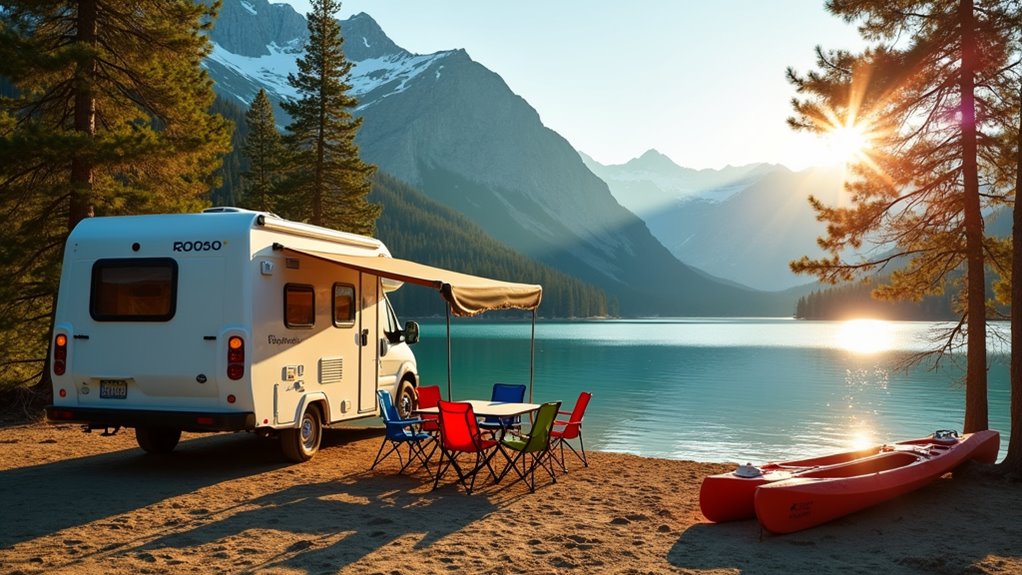
Where should you point your RV this summer for maximum family fun without breaking the bank? National parks offer unbeatable value with affordable camping fees and endless activities. Yellowstone’s geysers and wildlife viewing captivate kids, while Great Smoky Mountains provides free entry and scenic drives.
National parks deliver exceptional family value with low-cost camping and unlimited adventures that keep kids engaged all summer long.
State parks are budget-friendly gems—many offer lakes for swimming, hiking trails, and playgrounds.
Beach destinations like Myrtle Beach State Park combine ocean access with reasonable RV sites. For cooler summers, head to Colorado’s Rocky Mountain National Park or Michigan’s Sleeping Bear Dunes.
KOA campgrounds nationwide provide family amenities like pools and game rooms, though they’re pricier than state options.
Book early for popular summer spots, and consider weekday stays for lower rates and fewer crowds. Before hitting the road, ensure you understand RV rental requirements and have proper insurance coverage for your adventure.
Before you start browsing RV lots or rental websites, you’ll need to crunch the numbers on what makes financial sense for your family’s vacation plans.
If you’re planning just one summer trip, renting typically costs $150-300 per night plus insurance and fees. For occasional use, this beats the hefty upfront purchase price of $50,000-150,000 for new RVs.
However, if you’ll take multiple trips yearly or want specific features, buying might work better long-term.
Consider hidden costs too: insurance, storage, maintenance, and depreciation for owners versus mileage limits and potential damage fees for renters.
Factor in your comfort level with towing, maintenance skills, and storage space at home.
First-time RVers often benefit from renting different models before committing to purchase.
Don’t overlook that RVs can provide comfortable accommodations during winter camping as well, extending your potential usage beyond just summer months.
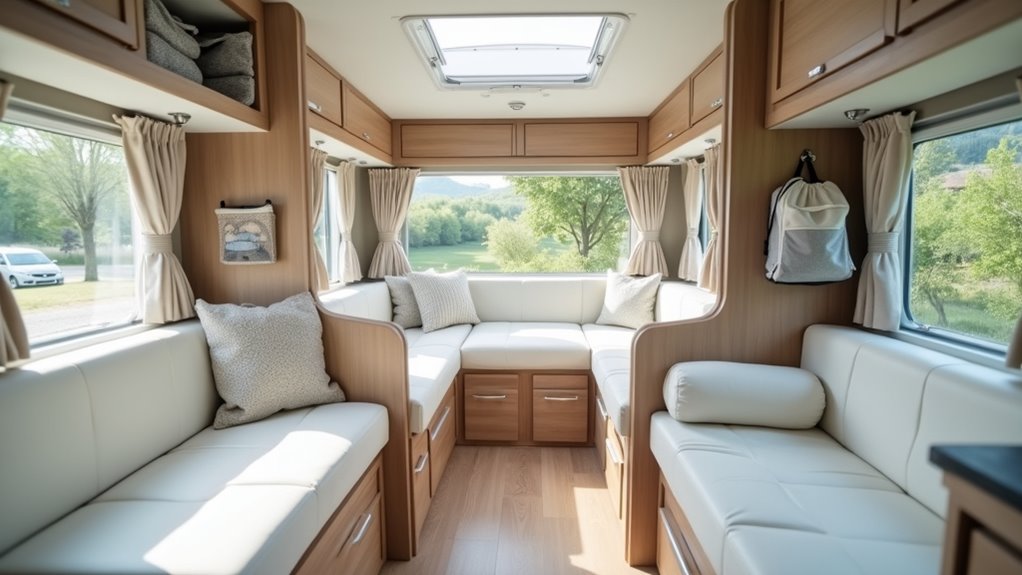
Once you’ve secured your RV, smart packing becomes your ticket to a stress-free vacation. Start by creating a detailed inventory list to avoid overpacking and forgotten essentials. Pack clothes in vacuum-sealed bags to maximize closet space, and choose versatile pieces that mix and match easily.
Utilize every nook by storing items in RV cabinets, under beds, and in external compartments. Pack heavy items low to maintain proper weight distribution. Bring collapsible containers, nesting bowls, and multi-purpose tools to save precious cabinet space.
Don’t forget the basics: first-aid kit, flashlights, and extra batteries. Pack non-perishable foods from home rather than buying everything on the road – you’ll save money and precious refrigerator space. Remember, less stuff means more comfort during your family adventure.
For families planning camping excursions in wooded areas, consider bringing a hammock for jungle environments as they provide elevated sleeping options that save ground space and offer better ventilation than traditional tents.
While RV adventures create magical family memories, traveling with children requires extra safety precautions that’ll keep everyone protected on the road. Install proper child restraints and booster seats that comply with both vehicle and state regulations – never let kids roam freely while driving.
Check smoke and carbon monoxide detectors before each trip, and pack a well-stocked first aid kit. Establish clear rules about staying seated during travel and designate safe play areas at campsites.
Keep emergency contact information easily accessible, and ensure you’ve got adequate insurance coverage. Teach children basic RV safety like proper entry/exit procedures and staying away from moving parts.
These simple precautions won’t break your budget but will provide invaluable peace of mind. When packing for your RV trip, apply weight reduction principles to keep essential items manageable and prevent overloading your vehicle.
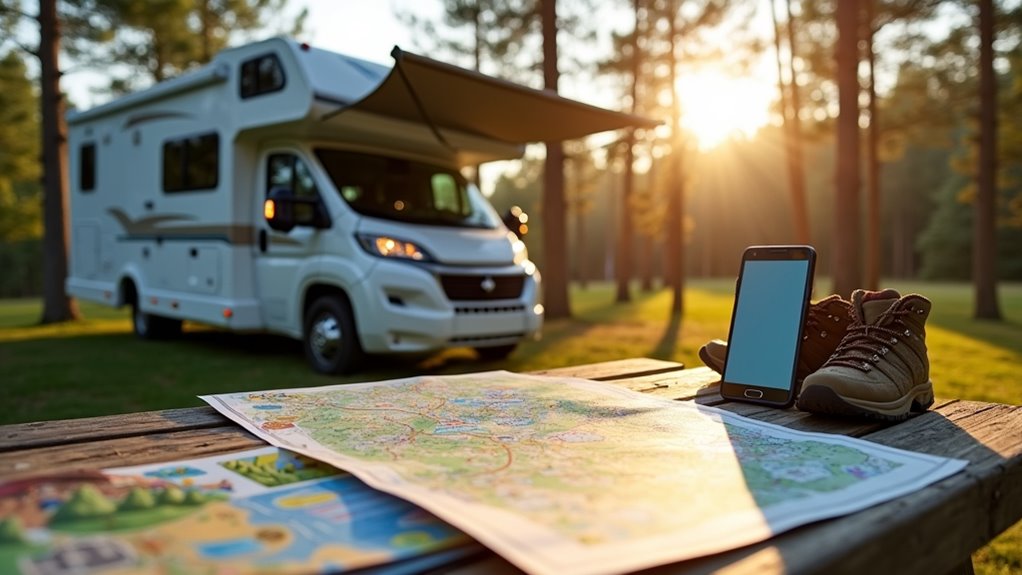
After you’ve secured your RV and packed the essentials, mapping out your journey becomes the backbone of a successful family adventure. Start by plotting realistic daily driving distances—typically 200-300 miles with kids to allow frequent stops and avoid fatigue.
Smart route planning with realistic daily mileage expectations sets the foundation for stress-free family RV adventures.
Book campground reservations well ahead, especially for popular summer destinations. State parks offer excellent value, while private campgrounds provide more amenities. Use apps like Campendium or KOA to compare prices and read reviews.
Plan fuel stops strategically, as RVs consume more gas than regular vehicles. Identify RV-friendly gas stations with adequate clearance and maneuvering space.
Create backup plans for weather delays or mechanical issues. Download offline maps since cell service can be spotty in remote areas. Building flexibility into your itinerary prevents stress when unexpected situations arise.
For adventurous families seeking unique destinations, consider incorporating glacier climbing trails into your route planning for an unforgettable summer experience.
Think of your family as explorers charting uncharted territories – you’re the captain steering your mobile home-sweet-home toward adventure. You’ve got your treasure map (budget), your compass (planning), and your trusty vessel (RV) ready to sail highways instead of seas. Don’t let another summer slip by anchored to expensive hotels. Cast off those dock lines, embrace the freedom of the open road, and create legends your crew will treasure forever.